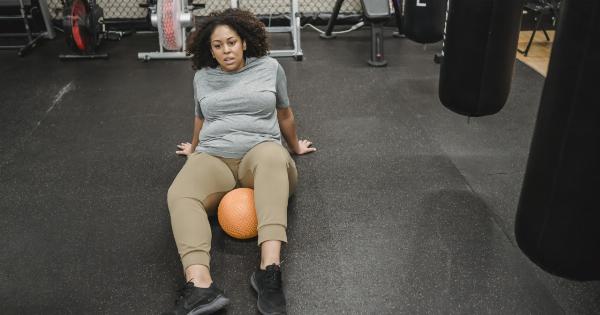Regular physical activity, such as going to the gym and engaging in exercises, is essential for maintaining optimal health and fitness. However, many individuals have noticed that their appetite changes after a workout session.
Some experience increased hunger, while others find themselves feeling less hungry than usual. The relationship between gym time and appetite is a fascinating topic that has intrigued researchers for years.
In this article, we will explore the science behind these fluctuations in appetite and discuss strategies on how to manage hunger levels effectively when exercising regularly.
The Science Behind Hunger and Exercise
When we exercise, our body undergoes various physiological changes that can affect our hunger levels. The intensity and duration of the workout play a significant role in determining how our appetite responds.
Let’s delve into the science behind these mechanisms:.
1. Hormonal Influence
Exercise stimulates the release of hormones that can impact our appetite. One such hormone is ghrelin, often known as the “hunger hormone.” Ghrelin is primarily produced in the lining of the stomach and signals hunger to the brain.
Research has shown that after intense exercise, ghrelin levels tend to increase, leading to increased feelings of hunger.
On the other hand, exercise also results in the release of hormones like peptide YY (PYY) and glucagon-like peptide-1 (GLP-1), which can suppress appetite and reduce food intake.
Studies have demonstrated that these hormones are associated with reduced hunger sensations, especially after prolonged endurance exercises.
2. Metabolic Changes
During exercise, our metabolism speeds up to support the increased energy demand. This metabolic boost can lead to a temporary suppression of appetite.
The increased release of catecholamines, such as epinephrine and norepinephrine, during intense exercise can reduce hunger signals and suppress appetite.
Furthermore, engaging in strength training and high-intensity interval training (HIIT) can elevate our basal metabolic rate (BMR), resulting in a higher calorie burn even at rest.
This increased calorie expenditure can, in turn, affect appetite, as our body may seek to restore energy levels post-exercise.
3. Energy Expenditure
The number of calories burned during a workout session is another factor that influences appetite changes. Intense workouts, such as cardio exercises or weightlifting, can lead to a higher energy expenditure.
As a result, our body may require additional calories to replenish the energy deficit, leading to increased feelings of hunger.
However, it is important to remember that individual responses to energy expenditure can vary. Some people may experience an increase in appetite, while others may not notice any significant changes.
Strategies for Managing Appetite During Gym Time
While fluctuations in appetite after gym sessions are entirely natural, it is essential to develop strategies to manage hunger effectively. Here are some tips to consider:.
1. Stay Hydrated
Dehydration can sometimes trigger feelings of hunger. Keep a water bottle handy and sip on water throughout your workout to stay hydrated. Drinking an adequate amount of water can help control false hunger signals.
2. Consume Balanced Pre- and Post-Workout Meals
Eating a well-balanced meal with a combination of carbohydrates, protein, and healthy fats before and after your workout can help regulate hunger. Carbohydrates provide energy, protein aids in muscle recovery, and healthy fats contribute to satiety.
3. Listen to Your Body
Pay attention to your body’s cues and eat when you genuinely feel hungry. Avoid eating out of habit or boredom. Tuning in to your body’s natural signals can help maintain a healthier relationship with food.
4. Incorporate Fiber-Rich Foods
Foods high in fiber, such as fruits, vegetables, and whole grains, can help you feel fuller for longer periods. Including these foods in your diet can help manage appetite and prevent overeating after gym sessions.
5. Choose Nutrient-Dense Foods
Opt for nutrient-dense foods that provide essential vitamins, minerals, and antioxidants. These foods can help meet your nutritional needs while keeping you satisfied and reducing excessive hunger.
6. Practice Mindful Eating
Mindful eating involves focusing on the present moment and savoring each bite. Slow down during meals, chew thoroughly, and pay attention to your body’s satiety signals.
This approach can help prevent overeating and promote a healthier relationship with food.
7. Plan Post-Workout Snacks
Keeping healthy snacks on hand can prevent mindless eating or grabbing unhealthy options when hunger strikes after a workout. Prepare portable snacks like nuts, yogurt, or protein bars to satisfy hunger while replenishing energy levels.
8. Get Enough Sleep
Quality sleep plays a crucial role in maintaining a healthy appetite. Lack of sleep can disrupt hormonal balance and lead to increased hunger and food cravings. Aim for the recommended 7-9 hours of sleep each night to support overall well-being.
9. Monitor Caloric Intake
While it’s essential to refuel your body after a workout, be mindful of overall caloric intake. It is possible to overestimate calorie burn during exercise and consume more calories than necessary, hindering weight management goals.
10. Consult a Registered Dietitian
If you find it challenging to manage your appetite during gym time or have specific dietary concerns, seeking guidance from a registered dietitian can be beneficial.
They can provide personalized recommendations based on your individual needs and help optimize your nutrition plan.
Understanding the relationship between gym time and appetite is crucial for effectively managing hunger levels while engaging in regular exercise.
By implementing strategies such as staying hydrated, consuming balanced meals, and listening to your body’s cues, you can achieve a healthier balance between exercise and appetite. Remember that everyone’s response to exercise-induced appetite changes may differ, so it’s important to find what works best for your body and individual needs.































